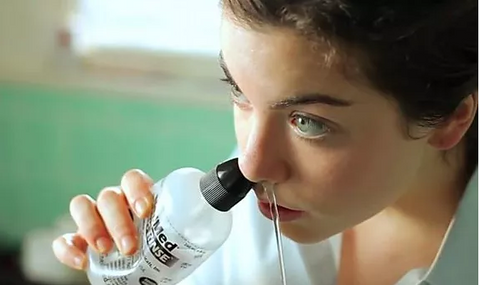Sinus
Saline sinus rinses are a natural, drug-free way to relieve sinus problems including snoring.
Using a nasal rinse containing salt water can help to thin and decrease the amount of mucus you produce in your nose, and stop it draining into the back of your throat. It also helps to rinse away irritants that make your nose itchy and make you sneeze.
If you're using a nasal rinse, use it before you use any nasal steroid medicines, such as Flixonase.
What is sinusitis?
The nasal sinuses are air-filled cavities inside the facial bones. Sinusitis is an inflammation of the lining of one or more of the sinuses.
Acute sinusitis is a very common condition and is often associated with viral or bacterial infections that spread to the sinuses. When the normal sinus openings become blocked, the cavities fill with infection often producing pain and a feeling of pressure over the affected sinuses. Other symptoms of acute sinusitis are fever, fatigue and nasal drip.
Chronic sinusitis is a longer term sinus problem that usually follows a single attack or repeated attacks of acute sinusitis. Postnasal drip, and nasal congestion are the most common symptoms of chronic sinusitis.
What is the medical treatment?
Most patients, who suffer an acute attack of sinusitis, generally get better by themselves without antibiotics, and if they do take antibiotics the majority of patients may have no further problems.
Oral antibiotics, decongestants and painkillers are frequently prescribed. Treatment may also include treatment for allergies or help to stop smoking.
How to rinse your sinuses
Although easy to use, the rinsing process may seem unusual at first and may take a little getting used to. Check out the video instructions here.
1. Draw up saline into the bottle. Tilt your head downward over a sink (or in the shower) and rotate to the left. Squeeze approximately 50 mls of solution gently into the right (top) nostril. Breathe normally through your mouth. In a few seconds the solution should come out through your left nostril. Rotate your head and repeat the process on the left side.
2. Adjust your head position as needed so the solution does not go down the back of your throat or into your ears.
3. Blow your nose very gently to prevent the solution from going into your ear and causing discomfort.
4. After using the rinse, you may continue using your prescribed nasal medications as normal. You may notice that they work better.
SINUS RINSE
NeilMed® SINUS RINSE is an easy squeeze bottle system that allows you to deliver the saline solution with positive pressure to clean the nasal passages thoroughly, while maintaining your head in an upright position.
You have complete control of the pressure and volume of solution, ensuring a gentle, soothing and therapeutic experience.
Daily rinsing is safe and will keep your nasal passages clean, healthy and open.
Precautions
Do not use sinus rinses if your nasal passageway is severely blocked.
Stop using if you experience pain, nosebleeds or other problems.
Where can I get more information?
For starters, it’s always a good idea to speak to your local pharmacist or your GP.
For more information on saline nasal rinses, try:
https://www.healthnavigator.org.nz/medicines/s/saline-nasal-sprays-drops-rinses/
https://www.healthinfo.org.nz/patientinfo/110759.pdf

